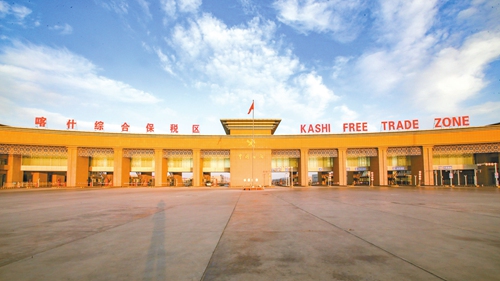From infrastructure to e-commerce, China-Central Asia cooperation deepens - Global Times
From infrastructure to e-commerce, China-Central Asia cooperation deepens
Sizzling business hub in Xinjiang

The Kashi Area of the China (Xinjiang) Pilot Free Trade Zone in Northwest China’s Xinjiang Uygur Autonomous Region File photo: VCG
Kashi Prefecture in Northwest China's Xinjiang Uygur Autonomous Region enjoys unique geographical advantages. It serves as a gateway for opening-up, connecting China with Central Asia, South Asia, West Asia and Europe. Relying on favorable policies, improved transportation infrastructure, and the promotion of cross-border exchanges, the prefecture has witnessed rapid growth in foreign trade.
"Do not underestimate this warehouse, it connects Central Asia and Europe," said a representative from Kashi Zhongshun E-commerce Co, while labeling packages within a warehouse at Kashi's comprehensive bonded zone. "The goods mainly include daily necessities and auto parts, which will be sent to countries such as Kazakhstan, Tajikistan, and Poland."
Kashi's comprehensive bonded zone plays a key role in advancing China's westward opening and the Belt and Road Initiative (BRI). Since the zone's operation in April 2015, it has transformed from a barren desert into a modern industrial park.
Inside the warehouse, workers busily loaded boxes of goods into containers from Kashi Zhongshun E-commerce Co. The goods will go through the customs clearance process at Irkeshtam Port and be shipped to the city of Osh in Kyrgyzstan, according to Zhang Qi, general manager of Zhongshun.
"We collect goods from the Yangtze River Delta and the Pearl River Delta and gather them in Kashi, before dispatching them to Central Asia, Europe and other places. Presently, we process over 120,000 e-commerce orders per day," Zhang told the Global Times. Zhongshun E-commerce Co is a foreign trade company established in Kashi's comprehensive bonded zone in 2020.
In recent years, Kashi in southwestern Xinjiang has been facilitating cross-border trade through the implementation of multimodal transport systems, in preparation for the China-Kyrgyzstan-Uzbekistan railway. The city has emerged as an attractive destination for enterprises seeking to capitalize on its key location, and Zhongshun is one of them.
Guo Shusong, director of the zone's management committee, told the Global Times that, as of the end of March, more than 806 enterprises had registered in the zone, with a total registered capital of 7.33 billion yuan ($1.01 billion). In 2024, the value of cross-border e-commerce in the zone reached 10.075 billion yuan, a year-on-year increase of 194.9 percent.
Notably, to facilitate international business, companies in the zone set up eight overseas warehouses last year in countries such as Kyrgyzstan, Tajikistan, and Pakistan, according to Guo.
"With the development of cross-border e-commerce, general trade and processing trade with a longer value chain have started to unleash their growth potential," said Guo.
According to data from Kashi Customs, Kashi completed a total foreign trade value of 16.8 billion yuan in 2024, a year-on-year increase of 37.31 percent.
Xinjiang's robust foreign trade growth is supported by strong policy measures and various initiatives to streamline customs clearance and improve related services.
"Kashi is a corridor connecting China with Central Asia, South Asia, West Asia, and even Europe. We are committed to providing support in streamlining customs clearance for trade enterprises and ensuring the stability of industrial supply chains," said a Kashi customs official.
Analysts said that cross-border e-commerce provides new growth points for trade between China and countries and regions along the BRI. Through digital platforms, Chinese small commodities, electronic products, agricultural products and daily necessities can more easily access the Central Asian market.
At the same time, it also provides a channel for regional specialty products to enter the Chinese market. The mature e-commerce experience in China can be extended to Central Asia and other countries involved in the building of the BRI, allowing local consumers to enjoy the convenience of life brought by digital trade.
China (Xinjiang) Pilot Free Trade Zone (FTZ) was established in November 2023. It encompasses three major areas - Urumqi, Kashi and Horgos - standing as the first FTZ in China's northwestern regions, the Xinhua News Agency reported.
In 2024, Xinjiang's foreign trade achieved robust growth. The region's import and export value reached 435.11 billion yuan, marking a 21.8 percent year-on-year increase and underscoring its remarkable resilience and vitality. In 2024, Xinjiang established trade relations with 213 countries and regions, with imports and exports to BRI partner countries rising by 18.7 percent, according to Xinhua.
Local logistics and seafood companies in Xinjiang are also aiming to make their home province a hub for Eurasian seafood trading, creating new trade routes linking the Arabian Sea, Central Asia, and Eastern Europe. Yan Linlong, CEO of the Dongbao Group in Urumqi, which originally sells imported and local seafood, told the Global Times that his company has ramped up business expansion in the global market this year.
Highlighting the potential for growth and collaboration in trade and logistics with Belt and Road countries, Yan said that as the BRI's joint development accelerates, Dongbao is actively leveraging Xinjiang's strategic role as a key FTZ pilot area in Northwest China.
"We are sourcing products from Kazakhstan and Belarus, bringing them to the Chinese market. As a national backbone cold-chain logistics base, we effectively connect with other inland logistics hubs, facilitating the transportation of vegetables and fruits to Xinjiang region and helping source imported products," he said.
According to Yan, the past two years have seen a surge of visitors from other Chinese provinces to Xinjiang for tourism, business, and investment opportunities. With more intense competition in the hinterland cities, Xinjiang and Central Asia are becoming increasingly attractive destinations for trade and investment.
Looking ahead, Yan expects trade between Xinjiang, Central Asia, and many Belt and Road partner countries to keep scaling up.
"We plan to build a billion-dollar logistics park focused on cross-border business. This project aims to strengthen Xinjiang's position as a premium logistics hub and improve its international market connectivity, so as to back up sustained regional growth," Yan said.
"By forging strong ties with Central Asian business partners, we ensure that a growing variety of fresh fruits and vegetables, dried fruits, and high-quality meats such as mutton and beef, sourced from Xinjiang and other regions across China, to reach dining tables in Central Asia and more countries, he noted.













